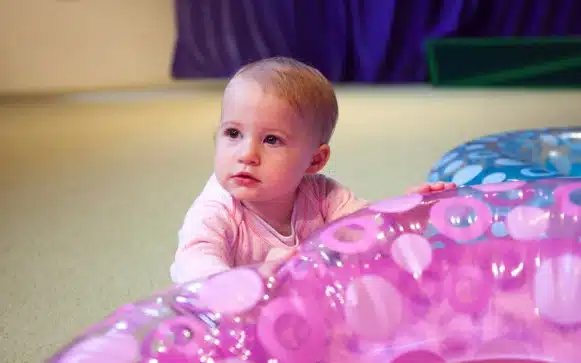New expressions and waves of first-time feelings — the emotional development in infants is outstanding to witness and to contribute to as a parent.
Guest author Angela Hunsicker, shares an outline of the basics of baby’s emotional growth:
- Every infant is on his/her own timetable
- Your positive responses fuel your child’s self esteem/emotional development
- Social/Emotional developmental milestones are a positive sign and temporary indicators of his/her emotional growth that he/she will outgrow on their own
Smile Response — 3 months
The smile response is your baby’s first developmental milestone. He or she will begin to smile at you and smile in response to you smiling back. The emotional development in infants thrives on relationships, especially on kind, compassionate and nurturing ones.
Chatty Baby
Your baby begins to talk to you as a newborn. It’s a universal phenomenon. Your baby babbles, squeaks, coos, and makes all sorts of noises to gain your attention and care. You visually see the response on her face when she sees your face and gets a response in return.
Babies love to know they caused you to care for them and receive your response. Respond and start a conversation! It’s good for their emotional health and speech development.
Active Baby
Your baby learns to roll over, crawl and walk in the first year+. Support their natural curiosity by encouraging and reassuring them while keeping a watchful eye on their safety. Some of the best baby proofing can be rearranging your home to keep baby safe while providing lots of interesting ways to explore.
Infants will scoot and scamper and then turn to meet your eyes. Your positive regard will help move them on while they build muscles in discover mode!
Stranger Anxiety — 8 months
Your baby has come to know your face and prefers it above others. Their varying degrees of angst from grim to bawling when seeing a strange face at the gym, grocery store, at family outings, etc. can typically be calmed by showing baby mom and/or dad’s face and gaining their reassurance.
Separation Anxiety — 12 months
Separation anxiety can be frustrating for parents when transitioning from one caregiver to another, especially if major changes are being made. You leaving can feel devastating to them. Reassure baby, yourself and others that these are wonderful signs towards emotional development in infants.
Your baby’s emotional development has begun and all of your positive time and attention fuels her self-esteem, building a reservoir to tap into for the rest of her life.
Share your favorite emotional milestone memories or any questions you have below or @BubblesAcademy.

Angela Hunsicker
Angela Hunsicker, LCSW is an experienced Licensed Clinical Social Worker, helping families, individuals and couples with a private practice in West Lakeview. AngelaHunsickerLCSW.com
Ideas on emotional development in infants are based on the parenting book, Smart Love: The Comprehensive Guide to Understanding, Regulating and Enjoying your Child by Martha Heineman Pieper, Ph.D. and William J. Pieper, M.D. (Smart Love Press, 2011).
If you have concerns about your baby’s social emotional development, reach out to gain professional guidance to learn more about your baby’s development.
